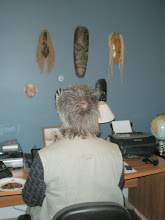We were reading The Tenth Tradition this week which mentions The Washingtonian Society and The Oxford Group, two organizations that were around before Alcoholics Anonymous and had some influence on its formation. The following is taken directly from Wikipedia.
In Akron, Ohio, Jim Newton, an Oxford Group member knew that one of Harvey S. Firestone's sons, Russell, was a serious alcoholic. He took him first to a drying-out clinic and then on to an Oxford Group conference in Denver. The young man "gave his life to God", and thereafter enjoyed extended periods of sobriety. The family doctor called it a "medical miracle." Harvey Firestone Senior was so grateful that, in January 1933, he invited Buchman and a team of sixty to conduct a ten-day campaign in Akron. They left behind them a strong functioning group which met each week in the house of T. Henry Williams, amongst whom were an Akron surgeon, Bob Smith, and his wife Anne. Bob was a secret drinker.
Rowland Hazard, claimed that it was Carl Jung who caused him to seek a "spiritual solution" to his alcoholism, which led to Rowland joining the Oxford group. He was introduced by Shep Cornell to Cornell's friend Ebby Thacher. Ebby had a serious drinking problem. Hazard introduced Ebby to Jung's theory and then to the Oxford Group. For a time Ebby took up residence at Sam Shoemaker's Calvary Rescue Mission that catered mainly to saving down-and-outs and drunks. Shoemaker taught inductees the concept of God being that of one's understanding.
Ebby Thacher, in keeping with the Oxford Teachings, needed to keep his own conversion experience real by carrying the Oxford message of salvation to others. Ebby had heard that his old drinking buddy Bill Wilson was again drinking heavily. Thacher and Cornell visited Wilson at his home and introduced him to the Oxford Group's religious conversion cure. Wilson, who was then an agnostic, was "aghast" when Thacher told him he had "got religion."
A few days later, in a drunken state, Wilson went to the Calvary Rescue Mission in search of Ebby Thacher. It was there that he attended his first Oxford Group meeting and would later describe the experience: "Penitents started marching forward to the rail. Unaccountably impelled, I started too... Soon, I knelt among the sweating, stinking penitents ... Afterward, Ebby ... told me with relief that I had done all right and had given my life to God." The Call to the Altar did little to curb Wilson's drinking. A couple of days later, he re-admitted himself to Charles B. Towns Hospital. Wilson had been admitted to Towns hospital three times earlier between 1933 and 1934. This would be his fourth and last stay.
Bill Wilson did not obtain his "spiritual awakening" by his attendance at the Oxford Group. He had his "hot flash" conversion at Towns Hospital. The hospital was set up and run by Charles B. Towns and his associate Alexander Lambert, who together had concocted up a drug cocktail for the treatment of alcoholism that bordered on quackery, known as "the belladonna cure". The formula consisted of the two deliriants, Atropa belladonna and Hyoscyamus niger, which were known to cause hallucinations. Wilson claimed to have seen a "white light", and when he told his attending physician, William Silkworth about his experience, he was advised not to discount it. After Wilson left the hospital, he never drank again.
After his release from the hospital, Wilson attended Oxford Group meetings and went on a mission to save other alcoholics. His prospects came through Towns Hospital and the Calvary Mission. Though he was not able to keep one alcoholic sober, he found that by engaging in the activity of trying to convert others he was able to keep himself sober. It was this realization, that he needed another alcoholic to work with, that brought him into contact with Bob Smith while on a business trip in Akron, Ohio.
Earlier Bill Wilson had been advised by Dr Silkworth to change his approach and tell the alcoholics they suffered from an illness, one that could kill them, and afterward apply the Oxford Practices. The idea that alcoholism was an illness, not a moral failing, was different from the Oxford concept that drinking was a sin. This is what he brought to Bob Smith on their first meeting. Smith was the first alcoholic Wilson helped to sobriety. Dr. Bob and Bill W., as they were later called, went on to found Alcoholics Anonymous.
Wilson later acknowledged in Alcoholics Anonymous Comes of Age: "The early AA got its ideas of self-examination, acknowledgement of character defects, restitution for harm done, and working with others straight from the Oxford Group and directly from Sam Shoemaker, their former leader in America, and from nowhere else."
In 1934 James Houck joined the Oxford Group and became sober on December 12, one day after Wilson did. AA was founded on June 10, 1935. In September 2004, Houck was the last surviving person to have attended Oxford Group meetings with Wilson, who died in 1971. At the age of 98, Houck was still active in the group, now renamed Moral Re-armament, and it was his mission to restore the Oxford Group's spiritual methods through the "Back to Basics program", a twelve step program similar to AA. Houck believed the old Oxford Group spiritual methods were stronger and more effective than the ones currently practiced in A.A. Houck was trying to introduce the program into the prison systems.
Houck's assessment of Wilson's time in the Oxford Group: "He was never interested in the things we were interested in; he only wanted to talk about alcoholism; he was not interested in giving up smoking; he was a ladies man and would brag of his sexual exploits with other members, " and in Houck's opinion he remained an agnostic.
